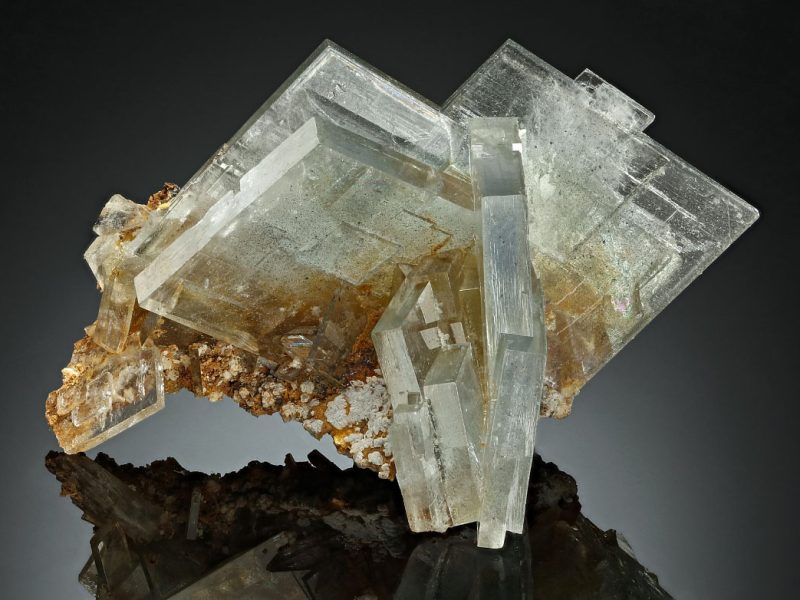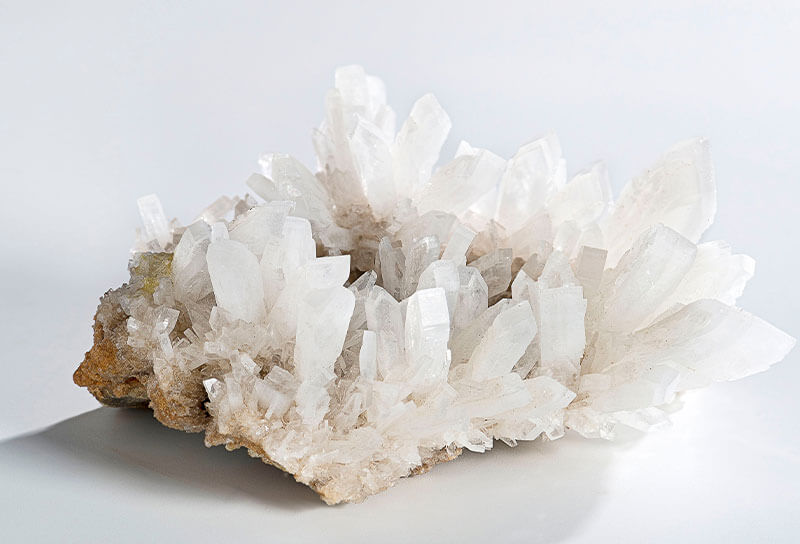Barite is a mineral composed of barium sulfate (BaSO4). It receives its name from the Greek ord “barys” which means “heavy.” This name is in response to barite’s high specific gravity of 4.5, which is exceptional for a nonmetallic mineral. The high specific gravity of barite makes it suitable for a wide range of industrial, medical, and manufacturing uses. Barite also serves as the principal ore of barium.
Between 69 to 77% of baryte worldwide is used as a weighting agent for drilling fluids in oil and gas exploration to suppress high formation pressures and prevent blowouts. An additional benefit of baryte is that it is non-magnetic and thus does not interfere with magnetic measurements taken in the borehole, either during logging-while-drilling or in separate drill hole logging. Baryte used for drilling petroleum wells can be black, blue, brown or gray depending on the ore body. The main usage of Barite is as follows:
Drilling Industry: The overwhelming majority of the barite that is mined is used by the petroleum industry as a weighting material in the formulation of drilling mud. Barite increases the hydrostatic pressure of the drilling mud allowing it to compensate for high-pressure zones experienced during drilling. The softness of the mineral also prevents it from damaging drilling tools during drilling and enables it to serve as a lubricant. The American Petroleum Institute (API) has established specifications for the use of barite in drilling mud.
Medical Industry: An application where many people have heard of barite is within the medical field. A high-purity form of barite is used in the gastrointestinal tract where its density prevents x-ray penetration, and thus is visible on an x-ray. The outline of the gastrointestinal tract thus becomes visible allowing the determination of normal and abnormal anatomy.
Other Uses: Barite is also used in a wide variety of other applications including plastics, clutch pads, rubber mudflaps, mold release compounds, radiation shielding, television and computer monitors, sound-deadening material in automobiles, traffic cones, brake linings, paint and golf balls.




ivermectine online – order generic atacand buy tegretol pills
order accutane 10mg for sale – buy generic zyvox over the counter linezolid 600mg tablet
buy generic amoxicillin for sale – buy ipratropium 100mcg without prescription ipratropium 100 mcg generic
brand zithromax 500mg – order tinidazole 300mg pills nebivolol oral
buy cheap omnacortil – buy prednisolone 10mg online buy prometrium generic
cheap generic gabapentin – itraconazole 100 mg cost sporanox 100mg price
lasix 40mg ca – order piracetam online cheap buy betnovate 20gm generic
buy generic doxycycline online – glucotrol order online buy glipizide 5mg generic
clavulanate sale – order duloxetine 20mg generic duloxetine uk
purchase augmentin pills – nizoral over the counter order duloxetine 40mg without prescription
purchase semaglutide online – buy semaglutide without prescription buy cyproheptadine tablets
zanaflex cost – buy hydroxychloroquine without a prescription microzide 25mg ca
viagra 100mg us – generic tadalafil 40mg cialis 5mg usa
purchase tadalafil – sildenafil viagra viagra 100 mg
cheap cenforce – purchase glucophage online cheap glycomet 1000mg generic
order generic lipitor 20mg – buy zestril 2.5mg generic where can i buy zestril
order prilosec 10mg generic – buy tenormin no prescription where to buy tenormin without a prescription
depo-medrol cheap – cost aristocort 4mg cost triamcinolone
generic clarinex 5mg – dapoxetine medication priligy medication
brand cytotec – oral misoprostol 200mcg diltiazem 180mg price
zovirax price – buy generic zovirax over the counter order rosuvastatin 10mg without prescription
where to buy motilium without a prescription – flexeril 15mg uk buy flexeril generic
motilium over the counter – buy cyclobenzaprine generic cheap flexeril
propranolol oral – buy generic methotrexate methotrexate 10mg cheap
buy warfarin sale – cozaar 25mg price order cozaar 50mg generic
esomeprazole 40mg cost – order nexium 40mg generic buy generic imitrex
buy generic levofloxacin over the counter – order levaquin 500mg for sale zantac online order
mobic 15mg pill – buy meloxicam 15mg online cheap flomax 0.4mg over the counter
buy ondansetron paypal – simvastatin 20mg sale purchase simvastatin without prescription
order generic valtrex 1000mg – oral valacyclovir 1000mg diflucan pills
cost modafinil 100mg order provigil online modafinil 200mg without prescription buy modafinil 100mg pills provigil brand modafinil medication modafinil 200mg sale
This is a keynote which is near to my verve… Many thanks! Exactly where can I lay one’s hands on the phone details for questions?
Thanks towards putting this up. It’s well done.
zithromax 500mg oral – zithromax 500mg tablet order metronidazole 200mg generic
rybelsus 14 mg over the counter – order semaglutide for sale periactin online order
buy motilium pills for sale – domperidone 10mg for sale order generic cyclobenzaprine
buy inderal pills for sale – purchase clopidogrel generic buy methotrexate 2.5mg generic
amoxicillin cost – valsartan 80mg brand buy combivent generic
Психоаналитик это психотерапевт практикующий психоанализ
Психолог или психотерапевт к кому идти 037
order zithromax online – generic tindamax bystolic 5mg pill
clavulanate pills – atbioinfo.com purchase ampicillin pill
buy nexium tablets – https://anexamate.com/ buy esomeprazole tablets
medex buy online – blood thinner cost cozaar 50mg
buy meloxicam – swelling how to buy mobic
prednisone for sale online – corticosteroid buy deltasone 10mg online cheap
erection pills that work – buy ed pills for sale buy ed medications
amoxicillin price – amoxil cost cheap amoxicillin tablets
buy diflucan 200mg pill – https://gpdifluca.com/# forcan over the counter
purchase escitalopram sale – escita pro buy generic lexapro 10mg
buy cenforce cheap – https://cenforcers.com/# buy cenforce generic
how long before sex should you take cialis – canada cialis for sale what is the generic name for cialis
cialis how long does it last – buy cialis shipment to russia cialis price walgreens
ranitidine 300mg over the counter – cost ranitidine order ranitidine 300mg
50mg viagra price – https://strongvpls.com/ can you buy viagra chemist
The sagacity in this serving is exceptional. online
Thanks on putting this up. It’s understandably done. buy accutane
Thanks on putting this up. It’s well done. https://ursxdol.com/furosemide-diuretic/
I couldn’t weather commenting. Warmly written! https://prohnrg.com/product/acyclovir-pills/
This is the kind of delivery I unearth helpful. https://aranitidine.com/fr/sibelium/
I’ll certainly carry back to read more. https://ondactone.com/product/domperidone/
More articles like this would remedy the blogosphere richer.
https://doxycyclinege.com/pro/spironolactone/
More posts like this would add up to the online time more useful. http://www.gtcm.info/home.php?mod=space&uid=1158207
forxiga order – https://janozin.com/ purchase dapagliflozin generic
buy orlistat online – https://asacostat.com/# how to buy orlistat
More content pieces like this would make the интернет better. http://bbs.51pinzhi.cn/home.php?mod=space&uid=7112340
You can conserve yourself and your stock by way of being heedful when buying pharmaceutical online. Some pharmaceutics websites function legally and put forward convenience, secretiveness, bring in savings and safeguards over the extent of purchasing medicines. buy in TerbinaPharmacy https://terbinafines.com/product/zantac.html zantac
More posts like this would make the online time more useful. TerbinaPharmacy
Thanks towards putting this up. It’s well done.
Просто знать – этого недостаточно.
Надо применять. Желать – этого недостаточно.
Надо делать
Если по делу.
Просто знать – этого недостаточно.
Надо применять. Желать – этого недостаточно.
Надо делать
Если по делу.
Просто знать – этого недостаточно.
Надо применять. Желать – этого недостаточно.
Надо делать
Если по делу.
Просто знать – этого недостаточно.
Надо применять. Желать – этого недостаточно.
Надо делать
Если по делу.
online casino gambling
online casino with live dealer
new casino sites casinos